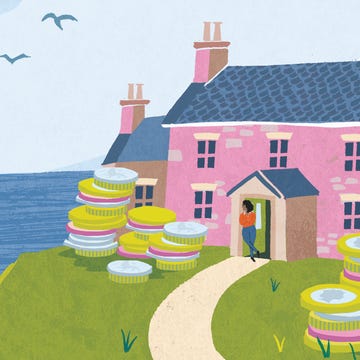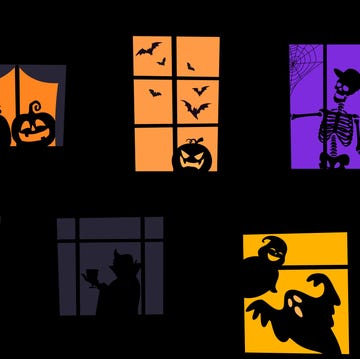Talk about a long build up! This autumn’s budget, the first of the new Labour government, has been discussed, worried about and bigged up almost since the new team arrived in No 10 back in July. Today was the big reveal and over the course of an hour and a half at the dispatch box in the House of Commons, Rachel Reeves delivered her much-anticipated list of measures to tackle the £22bn "black hole" in the nation’s finances, in a "no surprise" budget.
Before the election, Labour had already ruled out raising Income Tax, National Insurance or VAT, which on the face of it gave them limited room to manoeuvre. But in August, the prime minister warned us that October's Budget would be "painful" and the government would have some "big asks" of the public.
The government has already announced several measures including the scrapping of Winter Fuel Payment as a universal benefit to all pensioners and the introduction of 20% VAT on private school fees and boarding from January.
So, with all that in mind, just what did the first Labour budget in 14 years look like?
Earlier this morning, on X (formely Twitter), Reeves posted that today’s budget is about "fixing the foundations of our economy", "investing in our future" and "rebuilding Britain". At the dispatch box, she attacked the previous government for "playing fast and loose with the public’s finances", saying "the only way to drive economic growth is to invest, invest and invest". She confirmed she would be raising taxes by £40bn to restore economic stability.
On her role as the first female chancellor in Parliament’s 800-year history, her message to girls and young women was: "Let there be no ceiling on your ambition, your hopes and your dreams."
You can read the full contents of the Budget at gov.uk, and below are highlights of the major announcements and how they could affect household finances.
What is the Budget?
Each year, the minister in charge of the Government’s finances, the Chancellor of the Exchequer, makes a Budget statement to the House of Commons. Today’s Budget is a historic moment as it is the first one delivered by a Labour government in 14 years, and Rachel Reeves' first as Chancellor of the Exchequer - the first woman to hold this role. Reeves said how "deeply proud” she was to be the first female chancellor and her message to girls everywhere was: let there be no ceiling to your hopes.
What was in the 2024 Budget?
In a rowdy House of Commons, Reeves stated that the Labour government has a mandate to restore stability and start a decade of renewal. Change must be felt, she said, and there must be more money in people’s pockets.
National Insurance (NI)
Despite Labour specifically ruling out an NI hike for all, the Chancellor is increasing the National Insurance rate for employers as a means of boosting funding for public services, including the NHS. The Chancellor is also lowering the threshold for when employers start paying the tax – with the two measures combined to raise about £20bn.
*Employers' National Insurance increase
There will be a 1.2% point rise in the National Insurance employers pay from April 2025, increasing the rate from 13.8% to 15% on a worker’s earnings. But, the threshold at which businesses start paying NI on a workers’ earnings is being lowered from £9,100 to £5,000. It is expected to raise £25bn.
"For many employers, particularly those operating on tight margins, this increase in NI is likely to prompt a re-evaluation of salary structures and potential pay rises. Salary sacrifice schemes where employees voluntarily reduce their taxable income in exchange for benefits like additional pension contributions or even cars or bicycles could become increasingly attractive," says Jon Greer, head of retirement policy at Quilter.
*No extension of freeze on income tax and NI thresholds
The income tax thresholds at which people start paying NI or income tax, or have to pay higher rates, have been frozen since 2021 and are to remain at current levels until 2028. Despite much speculation, the Chancellor announced she was not going to extend the freeze on these thresholds any further. The freeze will remain until 2028 as planned.
Helen Morrissey, head of retirement analysis, Hargreaves Lansdown: "Raising employer National Insurance may not look like the type of change that will impact employees but over time it has the capacity to make a real dent in their financial resilience. Heaping extra costs on employers, alongside a planned uplift in the minimum wage will likely result in lower wage increases over the longer term. This will impact people’s day-to-day spending as well as their ability to save for the future. We could also see employers look to restrict the wider benefits they offer due to increased costs."
Inheritance tax freeze continues
Only about one in 20 UK estates now attract inheritance tax (IHT) but rising house prices and the increasing value of people’s investments and other assets are gradually pulling more people into the IHT net – a phenomenon known as fiscal drag.
In 2023/24, the Treasury took £7.5billion in inheritance tax receipts, twice as much as 10 years ago. The standard IHT rate is 40% and it is only charged on the part of the estate that is above the tax-free threshold, which is now £325,000. This threshold has been frozen since 2009 and Reeves has confirmed this will stay frozen until 2030. The threshold rises to £500,000 if the estate includes a residence passed to direct descendants and £1 million when a tax-free allowance is passed to a surviving spouse or civil partner.
Reeves said these and further changes to IHT will raise over £2bn by the end of the forecast period.
"Inheritance tax creates powerful emotions in people – mainly fear and loathing," says Sarah Coles, head of personal finance, Hargreaves Lansdown. "There’s something unpleasant about the taxman visiting the estate of someone who has died in order to fill his pockets, so it’s going to be particularly unwelcome that HMRC is set to dig deeper.
"While only 6% of the UK population is affected by IHT, that figure is on the rise. It’s only going to keep increasing now that inheritance tax thresholds have been frozen for another two years. It means heftier tax bills as the value of estates – including property – continues to climb. It means that even those people who are a long way from busting their inheritance tax limit will be anxious about these changes."
Pensions
*Pensions being brought into IHT
Until now pensions haven’t formed part of an estate for IHT purposes. The Chancellor is closing the exemption from tax for pension pots inherited if someone dies before the age of 75, from 2027.
One of the main criticisms of the way IHT is currently structured is that those with serious wealth can take advantage of complicated tax planning options to pass on assets to the next generation. However, it's worth remembering most 'ordinary' families are not hit by this tax.
Mike Ambery, Retirement Savings Director at Standard Life, part of Phoenix Group said: "It’s perhaps no surprise that the Government has decided to bring pensions into scope for inheritance tax as their exemption was little-known to the public. However, pensions have been seen as useful tool for estate planning and there will be individuals and families who have approached retirement and estate planning based on existing rules. Now, the value of pension pots will be added to the total value of other assets and if over the IHT threshold of £325,000, aside from other exemptions, will be taxed in the same way."
*State Pension increased
It’s now been confirmed that the State Pension will rise by 4.1% in April 2026, as expected, under the state pension “triple lock”, which raises the State Pension by the higher of wages, inflation, or 2.5%. More than 12m pensioners will gain up to £473 increase next year.
This will increase a full new State Pension to £230.30 a week - £11,975 a year. The full, old basic State Pension will go up to £176.45 a week. That will take it to £9,175 a year.
"While the state pension is on the up, it’s worth remembering that it still falls short of the £14,400 a single pensioner needs for a minimum standard of living in retirement, according to the Pensions and Lifetime Savings Association," says Mike Ambery, retirement savings director at Standard Life, part of Phoenix Group.
*No change on tax-free pension lump sums
Despite huge speculation, the Chancellor has not removed the ability to take 25% of a pension pot tax-free, originally bought in as part of the ‘pension freedom’ reforms following the 2014 budget.
Mike Ambery, Retirement Savings Director at Standard Life, part of Phoenix Group said: "The ability to take 25% of a pension pot tax free is one of the most loved and best understood features of the UK pensions system and has been spared any change. Ahead of the Budget there was a rush of savers looking to access their cash to avoid a possible cut in the allowance. For those who did so, the question now is what to do with this money."
Freeze in Fuel Duty
Fuel duty is charged per litre of petrol or diesel you buy when you fill up at a service station. It’s been frozen since 2011 and, taking in the temporary 5p cut that was introduced in 2022, currently stands at £52.95 per litre for both petrol and diesel.
In this Budget, the Chancellor confirmed that both the freeze on fuel duty and the 5p cut will be maintained. The move received a cautious welcome from John Cassidy, Managing Director of Sales at Close Brothers Motor Finance, who described it as "one less thing for drivers to worry about in the short term" while also highlighting the finance company's research that shows one in four (26%) drivers already think the cost of owning and running a car is becoming unaffordable.
There was other good news for motorists and cyclists alike, with the announcement of a £500million increase in the road maintenance budget next year. This will help address what Transport Secretary Louise Haigh recently called the "pothole plague" afflicting Britain’s roads.
Increased limit on Carer’s Allowance
The current system provides those with additional caring responsibilities with up to £81.90 a week in allowance. Now the weekly earnings limit is to increase to the equivalent of 16 hours per week at the national living wage. Carers can now earn over £10,000 a year and still keep their allowance.
Recently published research by Carers UK found that 4 in 10 carers experiencing difficulties with Carer’s Allowance had given up work as a result of the earnings limit and 62% said that they would have more paid work if the earnings limit was increased.
Alcohol duty
From February next year, alcohol duty will rise in line with inflation. However, there was good news for pubs and their punters alike with the announcement of a 1.7% cut to draft duty. The Chancellor said this would translate to a ‘penny off the pint in the pub’, an announcement that received a particularly enthusiastic welcome in the House of Commons.
Stamp duty increase on second homes
Reeves announced that second-home buyers will face a stamp duty land tax surcharge rise of two percentage points to 5%, starting from 31 October.
Vapes
From 1 October 2026, a vaping duty will be introduced for the first time at £2.20 per 10ml of liquid. There will also be a one-off tobacco duty rise to keep the incentive to choose refillable vaping over smoking. Reeves described this as a move to "discourage non-smokers and young people from taking up vaping".
Capital Gains Tax
Capital Gains Tax (CGT) is a tax on any profit you make when you sell certain assets worth more than £6,000, including jewellery or art, property that isn’t your main home and shares that aren’t held in an ISA. You only have to pay it once your total profits exceed your Capital Gains tax-free allowance of £3,000 (or £1,500 for trusts). The rate of CGT you pay depends on the rate of Income Tax you pay and on what you’re selling.
In this Budget, the Chancellor announced that CGT would rise from 10% to 18% for basic rate taxpayers and from 20% to 24% for higher rate taxpayers to bring these rates in line with the rates applied to gains made from the sale of residential property.
Commenting on the changes to CGT, Sarah Coles, Head of Personal Finance at Hargreaves Lansdown said: ‘Talking about things like capital gains tax as ‘wealth taxes’ obscures the fact that many people on average incomes, who’ve invested carefully throughout their lives, can face a tax bill when they rebalance their portfolio or sell up to cover their costs later in life. The annual allowance of £3,000 doesn’t stretch particularly far when you’re selling an investment you’ve held for 30 years or more, so investors should consider how to protect themselves.’
She adds that one option for investors keen to avoid CGT is to invest via a stocks and shares ISA or pension.
Minimum wage
In what she described as a "significant step", Reeves has increased the minimum wage to £12.21 an hour, a rise of 6.7%. Those aged 18-20 will receive an increase from £8.60 to £10, a rise of more than 16% and the largest increase on record. More than 3 million low-paid workers will be in line for a pay rise as a result.
Private school fees
Reeves confirmed that VAT will be introduced on private school fees from January 2025. She said the money would "help us to invest more in state education, improving standards and opportunities for all". Currently 94% of children in the country attend state schools.













